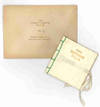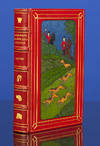
Manuscript letter
by CHURCH, Benjamin
- Used
- Condition
- See description
- Seller
-
Sheffield, Massachusetts, United States
Payment Methods Accepted
About This Item
CHURCH, Benjamin (1734-1776), Surgeon General of the Continental Army, convicted spy. Manuscript letter, 2pp., folio (minor repairs to right edge, with loss of a few letters; and a couple of letters lost from the iron ink used). N.p., n. d. [but probably June 1775]. Contemporary copy in an unknown hand, written on laid paper, with a difficult to decipher watermark which could be Pro Patria, docketed "A copy of the infamous Doctor Churches Letter to General Gage." In cloth folding case, with inner chemise.
In June, 1775, the Massachusetts physician and patriot entrusted to his paramour a letter in ciphers intended for his brother-in-law, the Boston printer and Loyalist John Fleming. The woman gave the letter to her former lover Godfrey Wainwood in Newport and addressed it to "Major Cane in Boston," but Wainwood opened the letter, which he could not read, and retained it. When the woman contacted him again inquiring about the letter, Wainwood was sufficiently alarmed that he contacted Henry Ward, Secretary of Rhode Island, who informed Nathaniel Greene. Greene promptly informed General Washington in Camridge, who had the woman arrested and interrogated on October 5th. Initially reluctant to cooperate, she finally confessed the letter had been given to her by Church, who was immediatly arrested and confined. Washington gave the task of deciphering the letter to Rev. Samuel West, who finished work on it in early October. At about the same time, Colonel Benjamin Porter, with assistance from Elbridge Gerry, also deciphered the letter (both version are extremely similar and are sometimes conflated).
Church's letters to British General Gage divulged intelligence regarding American munitions, military plans and equipment that would later prove critical to the British march on Concord. Church was tried before a military court consisting of Washington and his senior officers. Although he vigorously defended himself, arguing that his intent was to alarm the British with exaggerated reports of the Colonials' strength, resolve, and preparations, his explanations failed to carry weight, and he was judged guilty of carrying on criminal correspondence with the enemy, but final judgement was deferred to the Continental Congress. He was subsequently tried before the Massachusetts Geneal Court, again found guilty, and ejected from that body. Because Congress had not yet authorized the hanging of spies, Church evaded the death penalty. Congress then ordered him confined practically incommunicado in a Norwich, Connecticut, jail. His ill health won him limitted release from prison and he eventually was given leave in 1780 to board a ship for the West Indies. The ship was never heard from again and it is presumed Church was lost at sea with all hands.
Revelations of Church's activities caused a scandal and West's version of the letter became widespread, appearing in numerous newspapers and used repeatedly at Church's trials. (The Porter/Gerry version had no such widespread dissemination.) Briefly, Church had told Fleming of acivities relating to procuring cannon for the Continental Army, had revealed the existence of powder mills and other sources of wartime material, and written at length about the growing strength and resolve of the Continental Congress and the fledgling American army. Read today in light of reality, many of the statements are patently absurd and fase, as Church argued in his defense. He remarks, for example, of seeing at Philadelphia 2200 men under arms, including Quakers, he puts the army's strength at 18,000 men, he states that 20 tons of powder have arrived, augmenting the 20 tons already on hand; and states that levies are to raise the army to 22,000 soldiers, who will be supplemented by 10,000 militiamen. Yet, he closes the letter with a request that his correspondent write him in ciphers and a plea that he be careful, "Make use of every precaution or I perish."
Church's original cipher letter is in the Washington Papers at the Library of Congress. Also present there are West's decoded version, but it is in Gerry's hand. Other contemporaray copies are in the Continental Congress Papers at the National Archives (two copies) and at the Washington Headquarters Library at Morristown, New Jersey. All those versions are practically identical and are secretarial copies. Copies of the West and Porter/Gerry versions were also sold at the Sang sale; they are in private hands. Versions of the letter have been widely published, including in Peter Force's American Archives, 4th series, cols. 958-960, Ezra Stiles Literary Diary, I: 626-628; George Washington's Papers, Revolutionary War Series, 2: 103-105; and Massachusetts House of Representatives Journal, July-November, 1775: 202-203.
The present version of the letter is an enigma. Although it contains the same content as the two known decipherings, it departs substantially from them in numerous areas and represents yet another, hitherto unknown, contemporary text of the letter. For example, this version does not mention specific quantities of powder, but instead remarks: "A considerable quantity of powder has arrived at Philadelphia and other parts of the Continent." This version is also shorter, containing only about 700 words, as opposed to the approximately 800 in the known versions. Finally, because it is shorter it lacks much of the richness of detail of the known versions. Because Washington was fairly certain that someone had managed to get to Church's papers before his agent was able to, it seems likely that some possibly incriminating materials were never revealed at the time of Church's arrest and trials. Given the nature of this letter and its textual relation to the known deciphered versoins, it seems at least possible that this was an early version of the letter, perhaps a rough draft, that was removed from Church's papers before they were searched and then copied by an unknown person who was not aware of its genuine nature.
Church was chief physician of the first Army Hospital, Cambridge, MA, at the time of his arrest. Before that time, he had enjoyed a distinguished career as a physician and politician. He examined the body of Crispus Ataucks after the Boston Massacre and wrote a piece denouncing Britain's actions. He was a member of the Massachusetts Committee of Correspondence and a member of the Contiinental Congress from Massachusetts. Before his arrest , one of his last acts, alluded to in the letter, was to consult with the Continental Congress about the defense of Massachusetts.
Church's letter and motivations for writing it remain controversial. As John C. Fitzpatrick, The Writings of George Washington, observes: "There was a difference of opinion as to the intentions of Dr. Church. His letter contained little, if any thing, which could have an injurious effect upon the American cause. His conduct at his examination and trial was said to indicate guilt; and it was thought inconceivable, that a man of his sense and character should resort to such shallow means, and employ them in so strange a manner, to attain such a purpose as he peretended. It was indubitable, that he had held a secret correspondence with the enemy. This act was in itself deemed a crime of the deepest die. For this he was condemned and punished. If his designs were innocent, he was unfortunate; but the burden of proof lay on himself; and public justice could not be satisfied by his individual assertion, nor by the plea of folly or mistake" (4: 506).
An utterly unique item that is a crucial nexus in the understanding of Church's "conspiracy." The full text of our letter is available upon request by interested parties.
Reviews
(Log in or Create an Account first!)
Details
- Bookseller
- Howard S. Mott, Inc
(US)
- Bookseller's Inventory #
- 1048
- Title
- Manuscript letter
- Author
- CHURCH, Benjamin
- Book Condition
- Used
- Quantity Available
- 1
- Place of Publication
- N.p.
- Date Published
- [June 1775]
- Weight
- 0.00 lbs
- Keywords
- American Revolution
- Size
- F
Terms of Sale
Howard S. Mott, Inc
About the Seller
Howard S. Mott, Inc
About Howard S. Mott, Inc
Glossary
Some terminology that may be used in this description includes:
- Folio
- A folio usually indicates a large book size of 15" in height or larger when used in the context of a book description. Further,...
- New
- A new book is a book previously not circulated to a buyer. Although a new book is typically free of any faults or defects, "new"...
- Cloth
- "Cloth-bound" generally refers to a hardcover book with cloth covering the outside of the book covers. The cloth is stretched...



